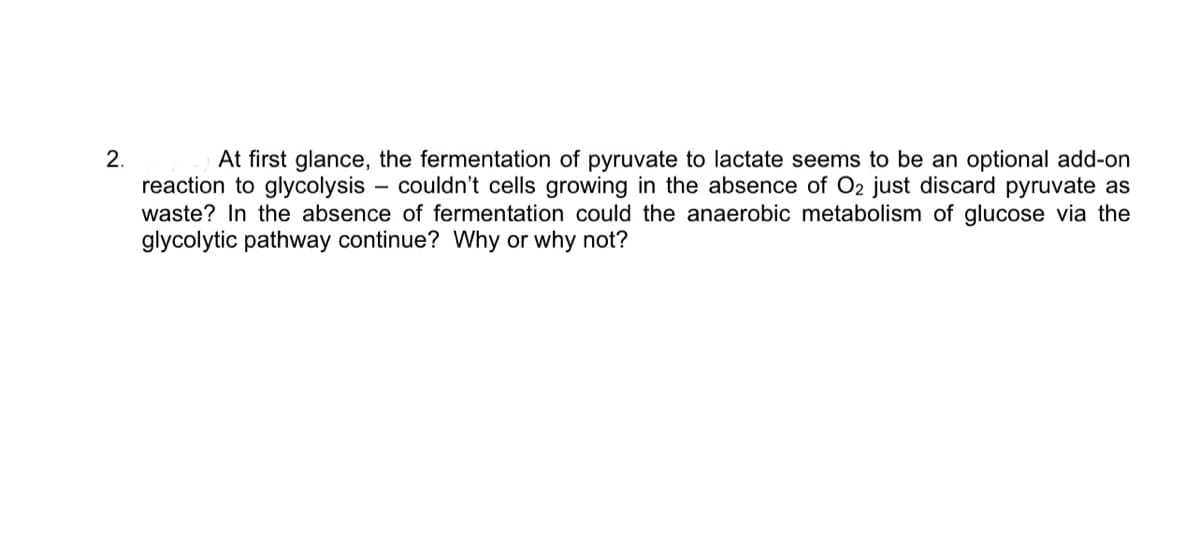1. The liver produces glucose to the rest of the body between meals by breaking down glycogen stores to form glucose-6-phosphate in the penultimate step. Glucose-6-phosphate is then converted to glucose by splitting off the phosphate (AG° = -3.3 kcal/mol). Why do you think that the liver removes the phosphate by hydrolysis, rather than reversing the glycolytic step where: glucose + ATP → G6P + ADP (AG°' = -4.0 kcal/mol)? By reversing this reaction the liver could generate both glucose and ATP.
1. The liver produces glucose to the rest of the body between meals by breaking down glycogen stores to form glucose-6-phosphate in the penultimate step. Glucose-6-phosphate is then converted to glucose by splitting off the phosphate (AG° = -3.3 kcal/mol). Why do you think that the liver removes the phosphate by hydrolysis, rather than reversing the glycolytic step where: glucose + ATP → G6P + ADP (AG°' = -4.0 kcal/mol)? By reversing this reaction the liver could generate both glucose and ATP.
Biochemistry
9th Edition
ISBN:9781319114671
Author:Lubert Stryer, Jeremy M. Berg, John L. Tymoczko, Gregory J. Gatto Jr.
Publisher:Lubert Stryer, Jeremy M. Berg, John L. Tymoczko, Gregory J. Gatto Jr.
Chapter1: Biochemistry: An Evolving Science
Section: Chapter Questions
Problem 1P
Related questions
Question

Transcribed Image Text:1. The liver produces glucose to the rest of the body between meals by breaking down glycogen stores to form glucose-6-phosphate in the penultimate step. Glucose-6-phosphate is then converted to glucose by splitting off the phosphate (ΔG°' = -3.3 kcal/mol). Why do you think that the liver removes the phosphate by hydrolysis, rather than reversing the glycolytic step where: glucose + ATP → G6P + ADP (ΔG°' = -4.0 kcal/mol)? By reversing this reaction the liver could generate both glucose and ATP.

Transcribed Image Text:**Question 2: Fermentation Pathway Analysis**
At first glance, the fermentation of pyruvate to lactate seems to be an optional add-on reaction to glycolysis—couldn’t cells growing in the absence of O₂ just discard pyruvate as waste? In the absence of fermentation, could the anaerobic metabolism of glucose via the glycolytic pathway continue? Why or why not?
Expert Solution
This question has been solved!
Explore an expertly crafted, step-by-step solution for a thorough understanding of key concepts.
This is a popular solution!
Trending now
This is a popular solution!
Step by step
Solved in 3 steps with 1 images

Recommended textbooks for you

Biochemistry
Biochemistry
ISBN:
9781319114671
Author:
Lubert Stryer, Jeremy M. Berg, John L. Tymoczko, Gregory J. Gatto Jr.
Publisher:
W. H. Freeman

Lehninger Principles of Biochemistry
Biochemistry
ISBN:
9781464126116
Author:
David L. Nelson, Michael M. Cox
Publisher:
W. H. Freeman

Fundamentals of Biochemistry: Life at the Molecul…
Biochemistry
ISBN:
9781118918401
Author:
Donald Voet, Judith G. Voet, Charlotte W. Pratt
Publisher:
WILEY

Biochemistry
Biochemistry
ISBN:
9781319114671
Author:
Lubert Stryer, Jeremy M. Berg, John L. Tymoczko, Gregory J. Gatto Jr.
Publisher:
W. H. Freeman

Lehninger Principles of Biochemistry
Biochemistry
ISBN:
9781464126116
Author:
David L. Nelson, Michael M. Cox
Publisher:
W. H. Freeman

Fundamentals of Biochemistry: Life at the Molecul…
Biochemistry
ISBN:
9781118918401
Author:
Donald Voet, Judith G. Voet, Charlotte W. Pratt
Publisher:
WILEY

Biochemistry
Biochemistry
ISBN:
9781305961135
Author:
Mary K. Campbell, Shawn O. Farrell, Owen M. McDougal
Publisher:
Cengage Learning

Biochemistry
Biochemistry
ISBN:
9781305577206
Author:
Reginald H. Garrett, Charles M. Grisham
Publisher:
Cengage Learning

Fundamentals of General, Organic, and Biological …
Biochemistry
ISBN:
9780134015187
Author:
John E. McMurry, David S. Ballantine, Carl A. Hoeger, Virginia E. Peterson
Publisher:
PEARSON